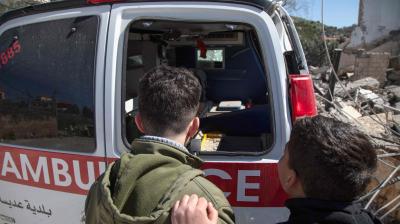US strike in Syria targets Jihadi John
A US strike on Syria that targeted British militant “Jihadi John” was “an act of self-defence”, Britain’s Prime Minister David Cameron said on Friday, while acknowledging his death was “not yet certai
A US strike on Syria that targeted British militant “Jihadi John” was “an act of self-defence”, Britain’s Prime Minister David Cameron said on Friday, while acknowledging his death was “not yet certain”.
Mr Cameron said the operation on Thursday against Mohammed Emwazi, who appeared in a string of graphic videos showing the execution of Western hostages, was a combined British-US effort.
In a statement delivered outside his Downing Street office, Mr Cameron said that, if confirmed, Emwazi’s death would be “a strike at the heart” of the ISIS militant group.
United States secretary of state John Kerry, speaking on a visit to the Tunisian capital Tunis, warned the group’s “days are numbered”, as Iraqi Kurdish officials declared that ISIS had been beaten back from the town of Sinjar in northern Iraq.
Analysts said the impact of Emwazi’s death would likely be symbolic rather than tactical for the jihadist group which controls swathes of Iraq and Syria and is known for widespread atrocities.
The Pentagon said Thursday’s airstrike hit Raqa, the group’s de facto capital in war-torn Syria. US media reported that it was a drone strike.
“Emwazi, a British citizen, participated in the videos showing the murders of US journalists Steven Sotloff and James Foley, US aid worker Abdul-Rahman Kassig, British aid workers David Haines and Alan Henning, Japanese journalist Kenji Goto, and a number of other hostages,” the Pentagon said in a statement.
He was last seen in the video showing Goto’s execution in January.Emwazi, a London computer programmer, was born in Kuwait to a stateless family of Iraqi origin. His parents moved to Britain in 1993 after their hopes of obtaining Kuwaiti citizenship were quashed.
A document published by Sky News revealed his birthdate to be August 17, 1988. As a child, he was a fan of Manchester United football club and the pop band S Club 7, according to a 1996 school year book published by the Sun tabloid.
He went on to study information technology at the University of Westminster, which confirmed that someone by that name left six years ago and said it was “shocked and sickened” by the allegations.
Dubbed “Jihadi John” after hostages nicknamed a group of ISIS guards The Beatles, he first appeared in a video in August 2014 showing the beheading of Foley, a 40-year-old American freelance journalist captured in Syria in 2012.
Foley is seen kneeling on the ground, dressed in an orange outfit resembling those worn by prisoners held at the US naval base at Guantanamo Bay. Emwazi is dressed entirely in black.
Foley’s mother Diane told ABC News that if Emwazi’s death were confirmed, it would be “small solace” to his family.
She referred to “this huge effort to go after this deranged man filled with hate when they can’t make half that effort to save the hostages while these young Americans were still alive”.
Two weeks after Foley, fellow US hostage Steven Sotloff was killed in the same manner, again on camera and by the same executioner.
Raffaello Pantucci of the Royal United Services Institute think tank in London said Emwazi’s death would make little strategic difference and could create a “martyr culture” around him.
But Charlie Winter, an academic who focuses on ISIS activities, said it could be a “big blow”. Cage, a London human rights group which worked with Emwazi in Britain before he left for Syria, reacted by saying he should have faced trial not death.
“Emwazi should have been tried as a war criminal,” the group said in a statement. The charity attracted criticism after Emwazi was named as “Jihadi John” in February, when it said that he had been alienated by his treatment at the hands of British security services between 2009 and 2012.
At the time, Cage’s research director Asim Qureishi described Emwazi as a “beautiful young man”.

















